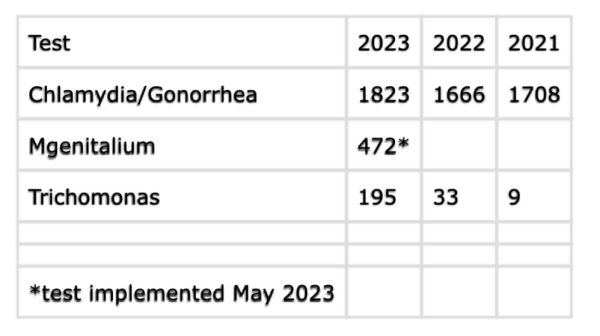A new sexually transmitted infection is in Chico and the WellCat Health Center is testing for it.
Mycoplasma genitalium, Mgen, is a curable bacterial STI that infects a person’s cervix, penile urethra or rectum through unprotected vaginal or anal sex.
Chico State nurse practitioner Jennifer Hopkins first heard about Mgen around 2019 at a UCSF women’s health conference. She said there was a prevalence of it in cities such as San Francisco and Los Angeles.
I would love to have the students just be aware that you know gonorrhea is in town, chlamydia is in town, Mgens in town, herpes is in town, syphilis is in town and a little HIV is in town.
— Chico State nurse practitioner Jennifer Hopkins
After the conference, Hopkins knew it would eventually spread to other locations. During that time she was unsure how patients could get tested since no one in Chico was testing for it.
Hopkins said the WellCat’s lab was able to test for Mgen in spring 2023, and that they are finding plenty of cases in Chico.
The Wellcat’s 2023 STD statistics stated that 472 students tested positive for a Mgen.

However, Hopkins reassured that this STI isn’t only affecting Chico and that there should be no cause for concern.
“So it’s everywhere, so it’s not a Chico thing,” Hopkins said. “It’s just that we are fortunate enough that our lab can test for it.”
A Chico State student who would like to remain anonymous said they tested positive for Mgen in October 2023 after getting regularly tested at the WellCat.
The student was asymptomatic and wasn’t frequently sexually active, which is why they were shocked when they heard their results.
“For any student reading this, it’s really important they know to make smart and safe decisions,” the student said.
The most difficult part for them was taking the medication for Mgen. The student said they suffer from chronic stomach issues and being on medication for a few weeks “was horrible.”
The student’s partner — also a student — was also able to get treatment and medication from the WellCat.
The student emphasized that others shouldn’t feel embarrassed about getting tested or seeking out help. They also emphasized the importance of asking a partner to get tested if they refuse to wear a condom.
“Don’t give in to the pressure from a partner regarding using a condom,” the student said. “That should be a personal boundary.”
The Center for Disease Control and Prevention said that a U.S. prospective multicenter study found, “Mgen was more common among ages 15 to 24 years than in people ages 35 to 39 years.”
How is it transmitted?
Mgen is spread through unprotected vaginal or anal sex. A person can have symptoms or be asymptomatic.
What are the symptoms and what can I do?
Patients may be asymptomatic but if not, the symptoms will vary among male and female patients.
The CDC states Mgen may cause urethritis among the male population and cervicitis or pelvic inflammatory disease among the female population.
The CDC also reports female patients may experience vaginal discharge, itching, discomfort when urinating and pelvic pain. Male patients may experience urethral discharge, pruritus and discomfort when urinating.
If a student believes they have been infected with Mgen they can make an appointment by calling the health center or by visiting the WellCat’s website. Through the website, students can request self-directed testing depending on their symptoms.
Testing and diagnosis
Mgen isn’t one of the standard STIs to test for, so it is tested based on symptoms.
Several STIs, such as chlamydia and gonorrhea have similar symptoms to Mgen. Therefore, director of administrative services Satia Sisay said testing for all three at once isn’t unusual.
Sisay recognized that conversations revolving around STIs are still taboo among this generation.
“We are not living in a society where people are 100% comfortable having these sorts of conversations,” Sisay said. “And so they’re just thinking they’re going to do the self-directed and they’re thinking that’s going to cover them for everything.”
Sisay said that being open and honest about symptoms is crucial when testing for and diagnosing Mgen. If students aren’t, it can get missed or misdiagnosed.
Mgen is tested through a urine sample or a vaginal swab.
If a student has been potentially exposed to an STI, there is a 14-day waiting period before they can get tested.
Testing before the waiting period may result in inaccurate results.
If a student is experiencing symptoms but the results come back negative, Hopkins said health providers wait a few weeks and later retest to ensure a correct diagnosis.
Complications
Because the STI and its testing is fairly new, Hopkins said there are some complications that come with it.
Its similarity to other infections may cause students to confuse their symptoms for other health problems.
Hopkins said that the majority of her positive Mgen male patients originally schedule an appointment thinking that they have a bladder infection or a urinary tract infection.
A worrisome side effect that Hopkins has commonly witnessed among Mgen-positive female patients is PID. This occurs when the infection has reached the uterus.
Sisay said that PID can be very uncomfortable and make patients very ill. If left untreated for a long time it can cause fertility issues.
The lack of testing sites in Butte County is also a problem for Hopkins. If a student has a partner who isn’t a student, they have limited access to testing and treatment.
Hopkins said that to limit the transmission of Mgen they make certain exceptions, but are still cautious as to who they offer treatment to.
“We have a few patients say ‘my partner cannot get tested, cannot get treated, can’t travel outside of Butte County,’ and in those cases, yes we are offering partner treatment in those specific cases,” Hopkins said.
Another issue Hopkins worries about is the spread of Mgen.
Students who are asymptomatic or unaware of having the STI, can unknowingly and increasingly spread the infection.
Once Mgen is detected, the patient will be prescribed medication.
Treatment and recovery
Patients are given antibiotics for 14 days. Hopkins said patients are given Doxycycline for one week and followed up with Moxifloxacin for another week.
Hopkins knows that this time period can be challenging to follow for some, but until a patient finishes their last pill, they are still contagious and can risk spreading Mgen to a partner.
Moving forward
With Mgen’s presence in Chico, Hopkins doesn’t want students to be worried. Instead, she wants students to be aware and informed about STIs.
“I would love to have the students just be aware that you know gonorrhea is in town, chlamydia is in town, Mgens in town, herpes is in town, syphilis is in town and a little HIV is in town,” Hopkins said.
Sisay added that college students are traditionally at a high risk for STDs. She said students should protect themselves and others.
“Everybody can do better by getting tested, by using condoms and just, you know there’s always room for improvement there,” Sisay said.
The health center provides a variety of free condoms, including larger, latex-free and non-lubricated condoms.
Students can schedule an appointment through their website or by calling 530-898-5241.
To read this article in Spanish, go here.
Milca Elvira Chacon can be reached at [email protected].
















